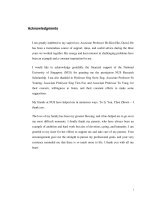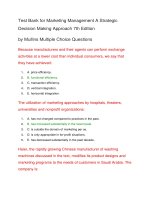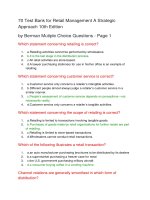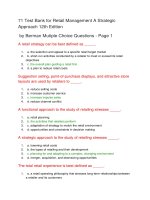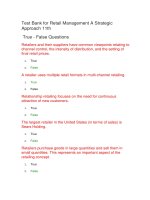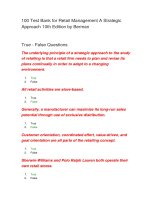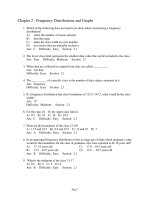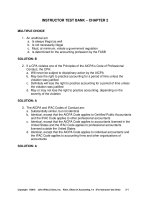Test bank for marketing management a strategic decision making approach 7th edition
Bạn đang xem bản rút gọn của tài liệu. Xem và tải ngay bản đầy đủ của tài liệu tại đây (32.82 KB, 11 trang )
Test Bank for Marketing Management A Strategic
Decision Making Approach 7th Edition
by Mullins Multiple Choice Questions
Because manufacturers and their agents can perform exchange
activities at a lower cost than individual consumers, we say that
they have achieved:
1.
A. price efficiency.
2.
B. functional efficiency.
3.
C. transaction efficiency.
4.
D. vertical integration.
5.
E. horizontal integration.
The utilization of marketing approaches by hospitals, theaters,
universities and nonprofit organizations:
1.
A. has not changed compared to practices in the past.
2.
B. has increased substantially in the recent past.
3.
C. is outside the domain of marketing per se.
4.
D. is only appropriate in for-profit situations.
5.
E. has decreased substantially in the past decade.
Haier, the rapidly growing Chinese manufacturer of washing
machines discussed in the text, modifies its product designs and
marketing programs to the needs of customers in Saudi Arabia. The
company is:
1.
A. trying to provide a unique benefit to a segment of the washing machine
market.
2.
B. trying to provide a unique benefit to the overall market for washing
machines.
3.
C. production oriented.
4.
D. trying to position its product as a me-too type of washing machine.
5.
E. trying to build economies of scale.
Dell Computer’s reliance on the Internet to attract customers and
process orders together with a flexible manufacturing system that
produces computers to order and minimizes finished inventories,
and Canon’s reliance on its own factories, salesforce, and
distribution facilities to produce and market its copiers and printers
are examples of a:
1.
A. vertically integrated distribution system.
2.
B. horizontally integrated distribution system.
3.
C. wheel-and-spoke distribution system.
4.
D. cohesive distribution system.
5.
E. pyramid selling system.
For some brand loyal customers what does wearing Levi’s 501
jeans provide that other jeans cannot?
1.
A. Need fulfillment
2.
B. Need creation
3.
C. Need recognition
4.
D. Want satisfaction
5.
E. Want recognition
Factors not created by marketers or other social forces, but flowing
from basic biological and psychological human makeup, are:
1.
A. needs.
2.
B. wants.
3.
C. demands.
4.
D. urges.
5.
E. requirements.
“A social process involving the activities necessary to enable
individuals and organizations to obtain what they need and want
through exchanges with others” is a definition of:
1.
A. distribution.
2.
B. marketing.
3.
C. barter.
4.
D. countertrade.
5.
E. industrialization.
In addition to being provided with physical objects, people’s needs
may be satisfied in a less tangible form through:
1.
A. differential forms.
2.
B. products.
3.
C. goods.
4.
D. services.
5.
E. product modifications.
Which aspect of the marketing management process does
environmental and competitor analysis represent?
1.
A. Marketing program components
2.
B. Implementing and controlling marketing programs
3.
C. Formulating strategic marketing programs
4.
D. Market opportunity analysis
5.
E. Strategic market communication
When the market is sufficiently homogeneous, a company can
practice marketing approaches that are:
1.
A. pre-emptive.
2.
B. differentiated.
3.
C. segmented.
4.
D. situational.
5.
E. undifferentiated.
What factor has changed in the past 10 years that has made the
customer service function far more important to the firm’s financial
success?
1.
A. global population levels.
2.
B. global competition levels.
3.
C. database marketing.
4.
D. wireless communications.
5.
E. market fragmentation.
Groups of institutions, or middlemen, that distribute goods are
known as:
1.
A. pyramid distribution systems.
2.
B. cohesive distribution system.
3.
C. horizontal distribution systems.
4.
D. wheel-and-spoke distribution systems.
5.
E. marketing channels.
Those who buy goods and services for resale, as inputs to
production of other goods or services, or for use in the day-to-day
operations of the organization are:
1.
A. intermediaries.
2.
B. ultimate consumers.
3.
C. organizational customers.
4.
D. utilitarian consumers.
5.
E. countertraders.
When a company is attempting to differentiate its products to
distinguish them from competitors’ products, in which aspect of
strategic management planning is the company engaged?
1.
A. Market segmentation strategy
2.
B. Distribution strategy
3.
C. Targeting strategy
4.
D. Pricing strategy
5.
E. Positioning strategy
Advertising, personal selling, point-of-purchase displays, and
publicity are related to which element of the marketing mix?
1.
A. Place
2.
B. Product
3.
C. Price
4.
D. Promotion
5.
E. Personnel
Those who buy goods and services for their own personal use or
the use of others in their immediate household are:
1.
A. utilitarian consumers.
2.
B. organizational customers.
3.
C. intermediaries.
4.
D. industrial customers.
5.
E. ultimate consumers.
“The process of analyzing, planning, implementing, coordinating,
and controlling programs involving the conception, pricing,
promotion, and distribution of products, services, and ideas
designed to create and maintain beneficial exchanges with target
markets for the purpose of achieving organizational objectives” is a
definition of:
1.
A. marketing communications.
2.
B. marketing management.
3.
C. marketing strategy.
4.
D. strategic management.
5.
E. marketing tactics.
What is the focus of marketing management?
1.
A. Analysis
2.
B. Coordination
3.
C. Beneficial exchange
4.
D. Distribution
5.
E. Execution
When a buyer purchases a new Fiat Punto and the purchase price
includes free parts and labor on repairs that occur within the first
three years or 36,000 miles, whichever comes first, what aspect of
the product does this component represent?
1.
A. Return policy
2.
B. Warranty
3.
C. Sales promotion
4.
D. Allowance
5.
E. Spare parts availability
The desire to drink a Coke instead of orange juice is an example of
a(n):
1.
A. necessity.
2.
B. need.
3.
C. demand.
4.
D. want.
5.
E. requirement.
What type of strategy states the company’s mission and its
strengths and policies for growth?
1.
A. Business-level strategy
2.
B. Functional strategy
3.
C. Marketing strategy
4.
D. Corporate strategy
5.
E. Segmentation strategy
Those who sell goods and services directly to final consumers for
their personal, nonbusiness use are:
1.
A. retailers.
2.
B. agent middlemen.
3.
C. merchant wholesalers.
4.
D. facilitating agents.
5.
E. commissioned agents.
A society cannot reap the full benefits of specialization until it
develops the means to facilitate:
1.
A. importation of essentials from other societies.
2.
B. production of essentials by each member of society.
3.
C. the trade and exchange of surpluses among its members.
4.
D. countertrade with other societies.
5.
E. production of goods in addition to services.
When a consumer purchases a product at a convenient location
and when she is ready to use the product, we say that the product
has achieved _________ utility and _________ utility, respectively.
1.
A. time; place
2.
B. place; time
3.
C. possession; place
4.
D. possession; functional
5.
E. time; possession
A gap between a person’s actual and desired state on some
physical or psychological dimension is a(n):
1.
A. unsatisfied need.
2.
B. want state.
3.
C. market inefficiency.
4.
D. demand function.
5.
E. intermediary.
The most important characteristic of marketing as a business
function is its focus on:
1.
A. interfunctional responsibilities.
2.
B. customer needs.
3.
C. barter exchange requirements.
4.
D. production efficiencies.
5.
E. technological trends.
When a non-profit organization, like a university, purchases copying
paper for its photocopying machines, what is it purchasing?
1.
A. A consumer good.
2.
B. A consumer service.
3.
C. An industrial good.
4.
D. An industrial service.
5.
E. An emotional good.
“Individuals and organizations who are interested and willing to buy
a particular product to obtain benefits that will satisfy a specific
need or want, and who have the resources to engage in such a
transaction” is the definition of a(n):
1.
A. industrial buyer.
2.
B. segment.
3.
C. opportunity.
4.
D. focus group.
5.
E. market.
When people buy products to satisfy their wants and needs, instead
of buying the products per se, they are buying:
1.
A. performance features.
2.
B. product attributes.
3.
C. benefits.
4.
D. physical attributes.
5.
E. goods.
The primary advantage to direct distribution for a firm like Dell
computers is:
1.
A. more control over channel activities.
2.
B. less hassle for the customer.
3.
C. broader market coverage.
4.
D. lower distribution costs.
5.
E. less hassle for the firm.
_____ is the combination of controllable marketing variables that a
manager uses to carry out a marketing strategy.
1.
A. Advertising
2.
B. Pricing strategy
3.
C. Market segmentation
4.
D. Publicity
5.
E. Marketing mix
In developed countries, approximately what percentage of the retail
price of consumer products consists of the costs of marketing and
distribution of these products?
1.
A. 10 percent
2.
B. 30 percent
3.
C. 50 percent
4.
D. 70 percent
5.
E. 90 percent
A manufacturer’s representative for General Electric is an example
of which type of “middleman?”
1.
A. Retailers
2.
B. Agent middlemen
3.
C. Merchant wholesalers
4.
D. Facilitating agents
5.
E. Commissioned agents
When the total market for a given product category is fragmented
into several groups of people having relatively homogeneous
needs, wants, and sought after benefits, these groups are termed:
1.
A. market fragmentation.
2.
B. a differentiated market.
3.
C. a counter-market.
4.
D. a market segment.
5.
E. market homogenization.
When PepsiCo attempts to define which products, promotions,
prices, and distribution arrangements to include in its snacks food
line, what type of strategy is it pursuing?
1.
A. Marketing strategy
2.
B. Functional-level strategy
3.
C. Corporate strategy
4.
D. Operational strategy
5.
E. Market segmentation strategy
What type of decision is reflected in an organization’s businesslevel strategy?
1.
A. Choosing suppliers
2.
B. Picking an advertising slogan
3.
C. Deciding how to compete in its business
4.
D. Deciding which products to sell
5.
E. Defining its overall purpose
When a company is attempting to determine what markets to target
their product towards as part of its strategic marketing planning
activities, which of the following is it attempting to define?
1.
A. Why its competitors have not already exploited this niche.
2.
B. What the best promotion vehicle would be for this market.
3.
C. Which segments have to be targeted.
4.
D. How to position the product.
5.
E. What its distribution strategy would be.
Studies have shown that, if their complaints were handled
satisfactorily, ____ percent of those who complain would do
business with the same company again.
1.
A. 30
2.
B. 10
3.
C. 50
4.
D. 70
5.
E. 90
Analyzing the 4Cs is necessary to provide the foundation for a good
strategic marketing plan. Which of the following is NOT one among
them?
1.
A. Company
2.
B. Context
3.
C. Customers
4.
D. Cost
5.
E. Competitors
Quality, features, style, options, brand name, packaging,
guarantees and warranties, and service are related to which
element of the marketing mix?
1.
A. Place
2.
B. Price
3.
C. Product
4.
D. Promotion
5.
E. Personnel
